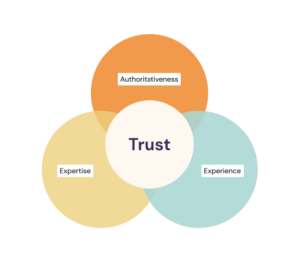3.4 経験、専門知識、権威、信頼(E-E-A-T)
経験、専門知識、権威、信頼(E-E-A-T) はすべて、PQ評価における重要な考慮事項です。E-E-A-Tファミリーの中心にある最も重要なメンバーは信頼です。

信頼:そのページがどの程度正確で、誠実で、安全で、信頼できるかを考える。必要な信頼の種類と量は、次の例のようにページによって異なります:
● オンラインショップは、安全なオンライン決済システムと信頼できるカスタマーサービスを必要とする。
● 商品レビューは正直で、(単に商品を売るためではなく)他の人が十分な情報に基づいた購入を決定出来るように書かれるべきです。
● YMYLの明確なトピックに関する情報ページは、人々や社会に危害を及ぼさないよう正確でなければならない。
● YMYL以外のトピックに関するソーシャルメディアへの投稿は、投稿の目的が視聴者を楽しませることであり、その内容が危害を及ぼす危険性がない場合など、高いレベルの信頼を必要としない場合がある。
経験、専門知識、権威は、信頼の評価を裏付ける重要な概念です:
|
|
経験:コンテンツ作成者が、そのトピックに関して必要な直接の経験や人生経験をどの程度持っているかを検討します。多くの種類のページは、個人的な経験の豊富な人が作成すると信頼でき、目的を十分に達成できます。例えば、個人的に製品を使ったことのある人の製品レビューと、使用していない人の「レビュー」のどちらを信頼しますか? |
|
|
専門知識:コンテンツ作成者がそのトピックに関して必要な知識やスキルをどの程度持っているかを検討します。トピックが異なれば、信頼に必要な専門知識のレベルや種類は異なります。例えば、家庭用電気配線のアドバイスとして、熟練した電気技師からのものと電気配線の知識がないアンティーク住宅愛好家からのもの、どちらを信頼しますか? |
|
|
権威:コンテンツ作成者やウェブサイトが、そのトピックの有力な情報源としてどの程度知られているかを検討します。ほとんどのトピックには、公式で権威のあるウェブサイトやコンテンツ作成者が1社もありませんが、存在する場合は、そのウェブサイトやコンテンツ作成者が最も信頼性が高く、信頼できる情報源であることがよくあります。例えば、ソーシャルメディア上のローカルビジネスプロフィールページは、現在販売されている商品に関する権威があり、信頼できる情報源である可能性があります。パスポートを取得するための政府の公式ページは、パスポートの更新に関する唯一の公式な、権威ある情報源です。 |
経験、専門知識、権威は、ページタイプやトピックによっては重複する場合があります (例えば、時間の経過とともに蓄積された実体験により、トピックに関する専門知識を身に付ける場合があります)。また、E-E-A のさまざまな組み合わせがさまざまなトピックに関係する場合があります。ページの目的、タイプ、トピックを考慮し、その文脈でコンテンツ作成者が信頼できる情報源になるにはどうすればいいか自問する必要があります。
信頼は E-E-A-T ファミリーの最も重要なメンバーです。信頼できないページは、経験豊富、専門家、権威があるように見えても E-E-A-T が低いためです。例えば、金融詐欺は、コンテンツ作成者が詐欺の実行で頼りにされるほど経験豊富で熟練した詐欺師であったとしても、信頼できません!
ページ品質評価に関しては、E-E-A-T の評価は、次の 1 つ以上の要素に基づいて行う必要があります:
● ウェブサイトやコンテンツ作成者が自らについて述べていること:まず ウェブサイトの「会社概要」ページや、コンテンツ作成者のプロフィールページをご覧ください。この情報に基づいて、ウェブサイトまたはコンテンツ作成者は信頼できる情報源でしょうか?
● ウェブサイトまたはコンテンツ作成者について他の人が述べていること:独立したレビュー、参考文献、ニュース記事、ウェブサイトやコンテンツ作成者に関する他の信頼できる情報源を探します。ウェブサイトまたはコンテンツ作成者が経験豊富で、専門知識があり、権威があり、またはその他の点で信頼できると見なされていることを示す独立した信頼できる証拠はありますか? ウェブサイトまたは作成者が信頼できないことを示す独立した信頼できる証拠はありますか?
● メインコンテンツやレビューやコメントなどのセクションを含む、ページに表示される内容:ページの種類によっては、MC自体から経験と専門知識のレベルが明らかになる場合があります。MCを調べたり、ページをテストしたりすることで、どのような証拠を集めることができるでしょうか?例えば、ヘアスタイリングの専門家であるかどうかは、その人が実際にヘアスタイリングをしている動画を見て(誰かのヘアスタイリングをしている動画)、他の人のコメントを読むことで(コメントの投稿者は専門知識の有無について強調することが多いです)、判断できるかもしれません。
重要:明らかに利害の対立がある場合ウェブサイトやコンテンツ作成者は信頼できる情報源ではない可能性があります。例えば、製品を所有しその体験を共有する人々による製品レビューは、非常に価値があり信頼できます。しかし、製品メーカーによる「レビュー」(「当社の製品は素晴らしい!」) や、製品の宣伝のために報酬を得ているインフルエンサーによる「レビュー」は、利益相反のため、それほど信頼できるものではありません。
最後に、信頼には多くの側面があり、経験、専門知識、権威性では捉えきれないものもあります。オンラインショップのカスタマーサービス情報や、学術的な著者の査読済み出版物など、全体的な信頼性評価では他の側面も考慮してください。何らかの理由で信頼できないページは、E-E-A-Tが低いということになります。
原文3.4 Experience, Expertise, Authoritativeness, and Trust (E-E-A-T)
Experience, Expertise, Authoritativeness and Trust (E-E-A-T) are all important considerations in PQ rating. The most important member at the center of the E-E-A-T family is Trust.
Trust: Consider the extent to which the page is accurate, honest, safe, and reliable. The type and amount of Trust needed depends on the page, for example:
● Online stores need secure online payment systems and reliable customer service.
● Product reviews should be honest and written to help others make informed purchasing decisions (rather than solely to sell the product).
● Informational pages on clear YMYL topics must be accurate to prevent harm to people and society.
● Social media posts on non-YMYL topics may not need a high level of Trust, such as when the purpose of the post is to entertain its audience and the content of the post does not risk causing harm.
Experience, Expertise and Authoritativeness are important concepts that can support your assessment of Trust:
Experience: Consider the extent to which the content creator has the necessary first-hand or life experience for the topic. Many types of pages are trustworthy and achieve their purpose well when created by people with a wealth of personal experience. For example, which would you trust: a product review from someone who has personally used the product or a "review" by someone who has not?
Expertise: Consider the extent to which the content creator has the necessary knowledge or skill for the topic. Different topics require different levels and types of expertise to be trustworthy. For example, which would you trust: home electrical rewiring advice from a skilled electrician or from an antique homes enthusiast who has no knowledge of electrical wiring?
Authoritativeness: Consider the extent to which the content creator or the website is known as a go-to source for the topic. While most topics do not have one official, Authoritative website or content creator, when they do, that website or content creator is often among the most reliable and trustworthy sources. For example, a local business profile page on social media may be the authoritative and trusted source for what is on sale now. The official government page for getting a passport is the unique, official, and authoritative source for passport renewal.
Experience, Expertise, and Authoritativeness may overlap for some page types and topics (for example, someone may develop Expertise in a topic due to first-hand Experience accumulated over time), and different combinations of E-E-A may be relevant to different topics. You should consider the purpose, type, and topic of the page, then ask yourself what would make the content creator a trustworthy source in that context.
Trust is the most important member of the E-E-A-T family because untrustworthy pages have low E-E-A-T no matter how Experienced, Expert, or Authoritative they may seem. For example, a financial scam is untrustworthy, even if the content creator is a highly experienced and expert scammer who is considered the go-to on running scams!
When it comes to Page Quality rating, your assessment of E-E-A-T should be informed by one or more of the following:
● What the website or content creators say about themselves: Look at the “About us” page on the website or profile page of the content creator as a starting point. Is the website or content creator a trustworthy source based on this information?
● What others say about the website or content creators: Look for independent reviews, references, news articles, and other sources of credible information about the website or content creators. Is there independent, reliable evidence that the website or content creator is experienced, has expertise, is authoritative, or is otherwise considered trustworthy? Is there independent, reliable evidence that the website or creator is untrustworthy?
● What is visible on the page, including the Main Content and sections such as reviews and comments: For some types of pages, the level of experience and expertise may be clear from the MC itself. What evidence can you gather from examining the MC or testing the page out? For example, you may be able to tell that someone is an expert in hair styling by watching a video of them in action (styling someone’s hair) and reading others’ comments (commenters often highlight expertise or lack thereof).
Important: The website or content creator may not be a trustworthy source if there is a clear conflict of interest. For example, product reviews by people who own the product and share their experiences can be very valuable and trustworthy. However, “reviews” by the product manufacturer (“Our product is great!”) or “reviews” from an influencer who is paid to promote the product are not as trustworthy due to the conflict of interest.
Finally, there are many aspects of Trust, some which are not captured by Experience, Expertise and Authoritativeness. Please consider other aspects in your overall Trust assessment, such as customer service information for online stores or peer-reviewed publications for academic authors. If a page is untrustworthy for any reason, it has low E-E-A-T.
Copyright 2024
